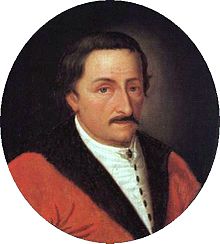Andrzej Maksymilian Fredro
Andrzej Maksymilian Fredro | |
|---|---|
 | |
| Coat of arms | Bończa |
| Born | 1620 Przemyśl land |
| Died | 15 June 1679 (aged 58–59) Przemyśl |
| Family | House of Fredro |
Philosophy career | |
| Era | Baroque philosophy |
| Region | Western philosophy |
| School | |
Main interests | |
Andrzej Maksymilian Fredro (1620 – 15 June 1679) was a Polish szlachcic and writer.
Biography
[edit]Andrzej Maksymilian Fredro was born in 1620.[5] He studied at the Cracow Academy.[5]
He was castellan of Lwów from 1654 and voivode of the Podolian Voivodeship from 1676. He was Marshal of the Sejm (zwyczajny) from 16 January to 11 March 1652 in Warsaw. At that sejm Władysław Siciński used liberum veto for the first time.[dubious – discuss][clarification needed] Fredro fortified Przemyśl in 1658–1660.[5]
He died on 15 June 1679.[6] In his political writing, Fredro argues that liberum veto is necessary for a republic as big as the Polish–Lithuanian Commonwealth. When one region of the Commonwealth falls into crisis, nobles from other regions may not be fully aware of the danger. Decision by majority in the Sejm is dangerous for such a big republic, because it enables the majority to ignore the interests of a particular region which has gotten into difficulty and asks the nation for help.[7]
He was married to Katarzyna Gidzińska.[6]

Works
[edit]- Gestorum Populi Poloni sub Henrico Valesio (1652)
- Przysłowia mów potocznych (1658)
- Scriptorum seu togae et belli notationum fragmenta (1660)
- Monita politicomoralia (1664)
- Militarium seu axiomatum belli (1668)
- Epistola ad amicum (1669)
- Vir Consilii (1730, released after his death)
See also
[edit]References
[edit]- ^ a b c "The Sarmatian Review Index: SR, September 2016". www.ruf.rice.edu. Retrieved 2022-11-22.
- ^ a b Urbański, Piotr (2010-01-01). "Stoicyzm i neostoicyzm w kulturze polskiej".
{{cite journal}}: Cite journal requires|journal=(help) - ^ a b "Fredro Andrzej Maksymilian, Encyklopedia PWN: źródło wiarygodnej i rzetelnej wiedzy". encyklopedia.pwn.pl (in Polish). Retrieved 2022-11-24.
- ^ H. Barycz: Andrzej Maksymilian Fredro wobec zagadnień wychowawczych. Kraków 1948, s. 31–33.
- ^ a b c Przyboś, Kazimierz (1997). "Fredrowie herbu Bończa domus antiqui moris virtutrisque cultrix" (PDF). Rocznik Polskie Towarzystwa Historycznego. Seria Nova. 3 (14): 99.
- ^ a b Przyboś, Kazimierz (1997). "Fredrowie herbu Bończa domus antiqui moris virtutrisque cultrix" (PDF). Rocznik Polskie Towarzystwa Historycznego. Seria Nova. 3 (14): 100.
- ^ Z. Ogonowski: Nad pismami A.M. Fredry w obronie liberum veto.. In: Z. Ogonowski: Filozofia polityczna w Polsce XVII wieku i tradycje demokracji europejskiej. Warszawa 1992, p. 26.
Further reading
[edit]- Władysław Czapliński, Fredro Andrzej Maksymilian [in:] Polski Słownik Biograficzny, vol. VII, p. 114.
External links
[edit]- Works by Andrzej Maksymilian Fredro in digital library Polona
- Secular senators of the Polish–Lithuanian Commonwealth
- 1679 deaths
- 17th-century writers in Latin
- Polish political writers
- Polish military writers
- 1620 births
- Fredro (Bończa)
- Polish educational theorists
- 17th-century Polish philosophers
- Military theorists
- Aphorists
- Baroque writers
- Polish writer stubs
- Polish nobility stubs
